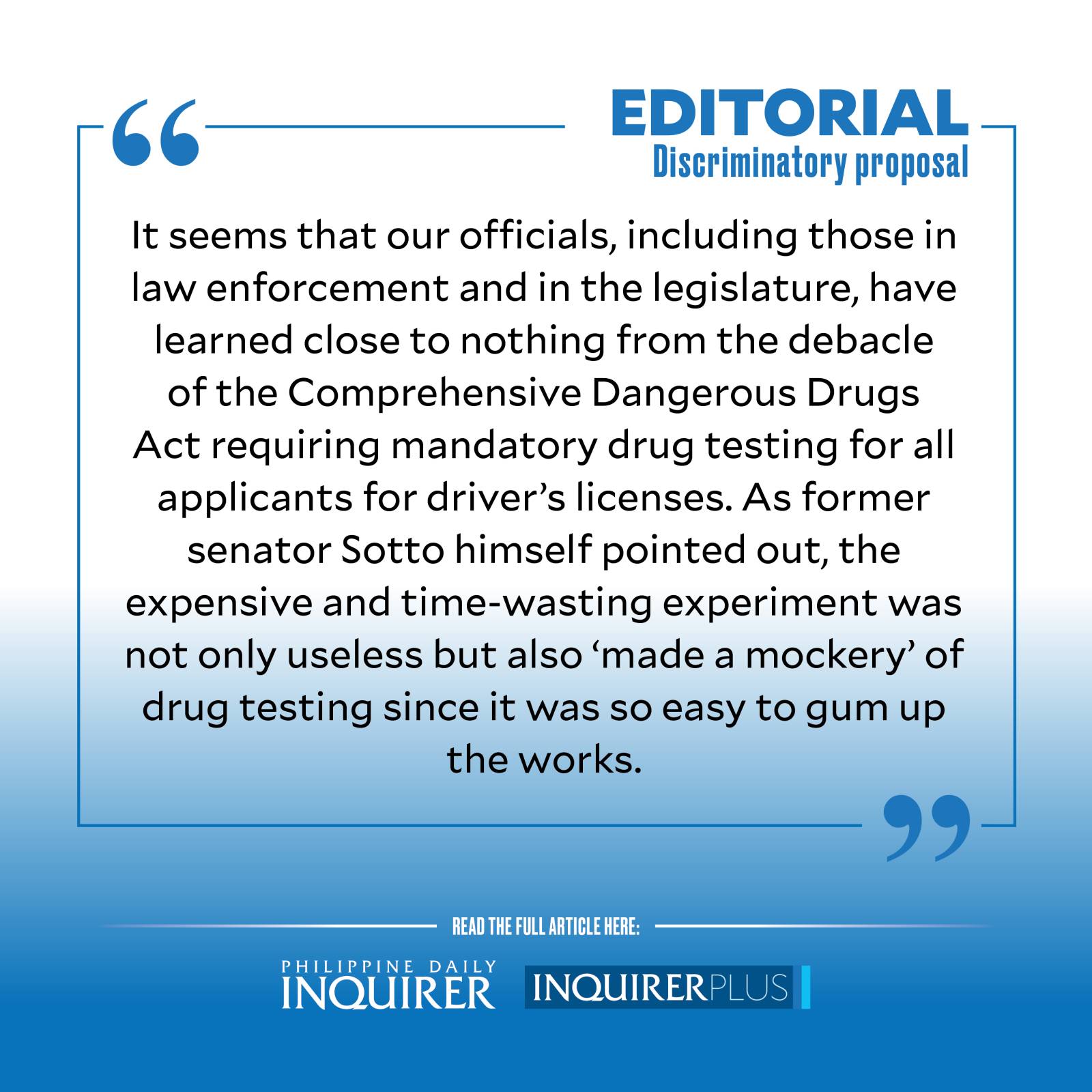Discriminatory proposal

Anyone who had applied and gone through the formalities of acquiring a driver’s license in the last two decades or so could well remember the rigmarole required to prove one was not under the influence of illicit drugs.
The requirement, contained in the Comprehensive Dangerous Drugs Act of 2002, was ostensibly to promote road safety, and protect other motorists and pedestrians from accidents caused by those “driving under the influence” of drugs. This was eventually rescinded under the Anti-Drunk and Drugged Driving Act of 2013.
Later, then Senate Majority Leader Vicente Sotto III (who would end his political career as Senate president), principal author of the Comprehensive Dangerous Drugs Act, himself expressed his belief that the mandatory drug tests were not only “a useless requirement” for applicants, but that doing away with them “allowed motorists a respite from costly drug tests” (then priced at more than P200 each).
Sotto was also quoted as saying that the mandatory drug test was “ineffective,” citing figures from both the Department of Health and the Dangerous Drugs Board showing that “out of millions, a mere 0.06 percent tested positive in drug tests conducted by the (Land Transportation Office) from 2002 to 2010.”
Users tend to abstain from drugs for several weeks before they renew their driver’s license, Sotto pointed out. “They are able to come clean during the drug test. It has led to a mockery of the drug test requirement.”
Sotto’s observations are relevant in light of the recent proposal of Rep. Ace Barbers, who chairs the House of Representatives committee on dangerous drugs, to require actors and celebrities to undergo drug testing before they are given movie and other entertainment projects.
Barbers’ proposal came in the wake of the arrest of actor Dominic Roco and four others during a sting operation last week. “Celebrities should be drug-free because they are public figures. The people, especially the youth, look up to them so they should not use drugs, or worse, sell drugs,” said the congressman from Surigao del Norte.
While Philippine National Police chief Gen. Rodolfo Azurin Jr. and House Majority Leader Manuel Jose Dalipe welcomed the legislator’s proposal, Sen. Robinhood Padilla, himself an actor before entering politics, protested its narrow scope. While stating that he is “one in seeking to protect Filipinos from the ill effects of drugs, including my fellow workers in the movie industry,” Padilla wants the proposal to cast a wider net, noting that government officials should also take drug tests voluntarily. “We cannot oblige everyone to undergo a drug test, as it is tantamount to violating their human rights,” he added.
Azurin embellished his agreement with Barbers’ proposal by declaring that local television networks and actors’ guilds should be “encouraged” to require their artists to undergo mandatory drug tests. He also urged artists themselves to take the initiative and get themselves tested and prove that they are “exemplary members” of the community.
It seems that our officials, including those in law enforcement and in the legislature, have learned close to nothing from the debacle of the Comprehensive Dangerous Drugs Act requiring mandatory drug testing for all applicants for driver’s licenses. As former senator Sotto himself pointed out, the expensive and time-wasting experiment was not only useless but also “made a mockery” of drug testing since it was so easy to gum up the works.
To be sure, as Barbers pointed out, Roco is not the only showbiz figure to be caught in the web of drug use and drug dealing, citing as recent examples actors Mark Anthony Fernandez and Julio Diaz, actresses Krista Miller and Sabrina M., disk jockey Karen Bordador and her boyfriend Emilio Lim, former child star CJ Ramos, and rapper Zaito. But they are only nine among the hundreds of entertainment figures still doing movies and TV shows, cutting records, and even appearing on TikTok videos. To single out performers from the millions of “people under the influence,” as cited by former president Rodrigo Duterte, is to engage in discriminatory law enforcement.
A more comprehensive, scientific, and humane approach to eradicating the drug menace is needed. After all, even Duterte’s war on drugs, still lamentably being carried out in some places, has proven to be as inutile as it has been deadly, as even its prime promoter had admitted.




















